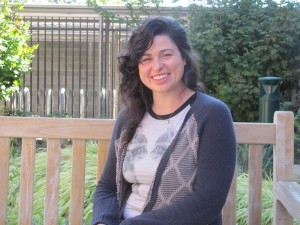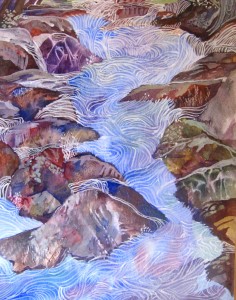By Kimberly Thomson
I was taking a quick shower Friday afternoon, having just returned from another week at Sun Pass Camp. The week had been another tough one, just like the four before. Scrubbing away the layers of pumice dust on my skin and hair, I started counting the mosquito bites, examining new bruises, and wishing it would be over. And like a shot of icy water, I suddenly realized this part of my life would be over, very soon in fact. Somehow this detail had escaped me for long enough that I forgot it for a while. As I was wondering on this topic my mind flipped back a few chapters to the start of my experience with RARE.
In early October I visited the Wood River with Aldo, Emmie, Sara, and Chantal on our first RARE family outing to Crater Lake. My supervisor and friend, Jennifer, had recommended we check it out since it was on the way and promised a great sight of emerald green waters. We pulled into Kimball State Park at the Wood River headwaters and got out to look around. Passing a handful of kids on the path down to the water I said, “Hey kids, seen some cool water?” The kids stared blankly back for a moment and then continued on their way with a wary look back for their parents. I had been snubbed. Although this moment became a RARE joke (thankfully one of many at this point) we continued on to see some spectacularly cool water and then some cool caves and cool craters and cool trees and just had an overall cool weekend.
Skipping ahead eight months, I’m shaking my head at the irony of spending the past four weeks talking to kids about that cool water. The difference is that now, as a camp counselor, kids have to listen to me talk about the beaver and macro-invertebrates and habitat adaptations before going in. And let me tell you, those kids are in love with that cool water, so it has become a very useful bribe for good behavior and general sanity.
In circling back to where I began, I saw how my life has been bookmarked by moments like this, when life gives you a nicely wrapped package of “see, look how much you’ve learned from this experience”. So with the new learning tucked into the corner of my mind I jumped out of the shower and rushed off to a meeting, reminding myself to e-mail Titus later to ask for a blog re-write.
I remembered and Titus said yes so without further ado here is what I have discovered as a RARE Year 22 Participant addressing the challenges of a rural community facing resource inefficiencies and inequities:
This is not enough. What I am doing, what the program is doing, what the whole state and even the entire country is doing is not enough. And I say that as a fact due to the magnitude of our collective challenges, not as a reflection of individual effort. What I have seen from my fellow RARE participants over the past nine months has been nothing short of tremendous and I have enjoyed getting to know the communities they are working with through their experiences. So I know I am not alone in thinking that there is still so much work to be done for any sense of overall community success to be felt. My own community of Klamath Falls is no different.
But that is the reality of where we are today and where we all stand, looking though a tunneled vision at our futures. Our political climate, our foreign agenda, the collective financial burden, and the percentage of our population living with staggeringly poor environmental and health conditions are placemats at our dining room table. They frame what we are eating, how we are consuming, and what we are sharing so much so that it is now difficult to find someone who could send a postcard overseas saying, “Things are going super well for everyone here! I don’t ever see problems in my community that could be easily addressed if people would just see it from my perspective! Nor do I ever curse a state or federal policy that is ruining my life and I have definitely never gotten a headache from my last meeting with people that think differently from me.” But here’s the good news; that is what everyone is going through. Whether you are a staunch Republican, dedicated Liberal, or a proud member of the “Screw Them All” party, you know there is a lot of crap to work out. I know it. We all know it.
So what I realized while taking my weekly shower was that the time I have spent with Klamath Falls middle schoolers down at the cool water of the Wood River has made this point so incredibly more important. The three-hundred-some kids, teachers, and chaperones that I have met through this camp know the issues better than most. I was not expecting to have so many children speak about the fears and pains of adults. These children cried and chanted together in response to Trump v. Bernie debates while they drank lemonade and ate nachos during lunch. They asked me how at 26, I could seriously not have children because their parents and siblings all had kids before 19. They shared in quiet voices that it was nice to be at camp, where they don’t have to share a trailer with their mom’s boyfriend and his six kids. They asked me to spell words that were many years below their reading level and near half spent part of their mornings and evenings being administered some kind of medication.
I have heard about the five kids that have been homeless all year, living in a tent even during the winter, and the ten that have open CPS cases and the other six that couch surf with friends because no one is home to take care of the house or buy groceries. Their teachers and chaperones, they have known all of this, how we are setting up a generation and our own futures for failure if we do not help to address these adult issues our children are already inheriting. And these children made it clear that while we aren’t starting from scratch and we have infrastructure to support such efforts, it’s still not nearly enough.
So what’s the point in doing a program like RARE? The point is to show up and try and learn as much as you can so that you can go on to help design a smarter future. Your one project and eleven months will not be enough. It’s what you will go on to do, with this experience imprinted on your path, that really matters. These kids aren’t stupid. They have a keen sense of ingenuity, so let’s give them a societal design they can use. I am sure they will start finding solutions we have never thought of.
So with all of the heaviness these thoughts have brought me, I have found great reassurance for our futures from the people I have met through this program. I feel very fortunate to have been surrounded by the talent and intelligence Titus and Megan collected together this year and I am so anxious to see their remarkable accomplishments that lie ahead. I want to thank each of them and all that have participated in the RARE experience for picking up a rake and working through a part of our collective future. Know how important their work has been because those kids down there at the cool water, they need us, so much more than I thought.
Kimberly Thomson
Kim received her bachelor’s degree in Human Development and Family Studies with a minor in Spanish from the University of Illinois at Urbana-Champaign, and her Master of Social Work from the George Warren Brown School of Social Work at Washingto n University in St. Louis. After attaining her degrees, Kim volunteered with the Yantalo Foundation in Peru where she researched, designed programs, and created programming to address topics such as family violence, drug and alcohol abuse, sexual health, eating disorders, depression, and suicide. She then became a Family Case Manager for the Children’s Hospital of Wisconsin, coordinating assistance provided to children and families. Now with RARE AmeriCorps – Resource Assistance for Rural Environments, Kim hopes to expand her skills in program development in rural communities while working in a region she wants to continue to live in and work in while sharpening her direction in life.
n University in St. Louis. After attaining her degrees, Kim volunteered with the Yantalo Foundation in Peru where she researched, designed programs, and created programming to address topics such as family violence, drug and alcohol abuse, sexual health, eating disorders, depression, and suicide. She then became a Family Case Manager for the Children’s Hospital of Wisconsin, coordinating assistance provided to children and families. Now with RARE AmeriCorps – Resource Assistance for Rural Environments, Kim hopes to expand her skills in program development in rural communities while working in a region she wants to continue to live in and work in while sharpening her direction in life.

